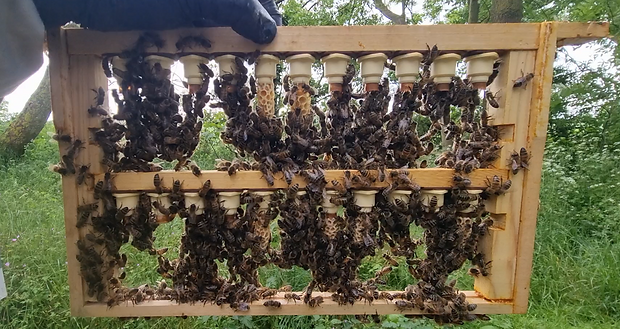
Queen Bee Breeding
Located in the picturesque counties of Northamptonshire, Bedfordshire and Buckinghamshire, our apiaries are dedicated to breeding locally adapted queen bees that thrive in the UK environment. As proud members of BIBBA (Bee Improvement and Bee Breeders Association), we are committed to reducing the reliance on imported queen bees and enhancing the resilience of local bee populations.
Queen Bee Breeding Programme at Bee Hut
The Importance of Local Adaptation
Importing queen bees from countries with different climates, such as Italy or southern Europe, poses significant challenges. These bees are often not well-suited to the UK’s unique weather patterns and environmental conditions. By focusing on locally adapted queen bees, we ensure that our bees are bred to thrive in their specific surroundings. This not only promotes healthier, more productive colonies but also supports biodiversity and the sustainability of local ecosystems.
Our Breeding Techniques
At Bee Hut, we employ breeding techniques to produce high-quality queen bees. We utilize both grafting larvae and our unique cell punch method to raise queens. Here’s a glimpse into our process:
-
Grafting Larvae: We carefully select larvae from our best-performing colonies and graft them into queen cups. These grafted larvae are then placed into a cell builder, a hive specially prepared with a strong population of bees to support queen rearing.
-
Cell Punch Method: In addition to grafting, we have developed our own cell punch method. This innovation arose from the difficulty of keeping a steady hand and seeing the eggs/larvae in the bottom of the wax cells, making it sometimes hard to graft efficiently when out at the apiaries. Our custom-designed cell cup holder and graft punch integrate seamlessly with the Nicot queen rearing system. This allows us to interchange components and utilize commercially available queen cages, cell cup bar holders, and other supplies from Nicot and similar suppliers. This technique has significantly improved our queen production, especially when we forget our glasses on grafting day!
The cell punch and graft-free kit is not currently available for sale, but if you’re interested, get in touch, and we can see what we can do for you. -
Cell Builders: Our cell builders are robust hives full of bees, meticulously maintained to provide optimal conditions for queen development. These hives ensure that the grafted larvae receive ample royal jelly, leading to the production of healthy, vigorous queen bees.
Sustainable Mating Practices
Our commitment to sustainability extends to the way we raise our queen bees. At Bee Hut, we use wooden queen mating hives crafted by ourselves, avoiding the common use of poly mating hives. By choosing wooden hives, we significantly reduce our plastic use in the queen breeding process. This not only aligns with our environmental values but also promotes a more sustainable approach to beekeeping.
Breeding Season and Future Plans
We begin our queen bee production in late April, depending on the weather, and continue through the summer. Currently, we do not sell queen bees individually, but offer them as part of our nucs (nucleus colonies).
Looking ahead, we plan to overwinter British open-mated, locally adapted queen bees from winter 2024 into spring 2025. This initiative aims to assess the market demand for overwintered queens, providing a solution for beekeepers who experience queen loss in autumn/winter or spring and prefer not to use imported queens. For this trial, we intend to overwinter approximately 50 queen bees.
Watch for updates on Instagram and this page as we progress into autumn and winter 2024.
Open Mating and Genetic Diversity
Our queen bees are open-mated at our Northamptonshire and Bedfordshire apiary sites. This method allows queens to mate with a diverse range of local drones, enhancing genetic diversity within the colonies. To support this, we also focus on raising drones from various genetic lines within the area. This ensures that our queens have access to a sufficient number of drones, increasing the likelihood of successful mating and robust offspring.
By prioritizing locally adapted queen bees and fostering genetic diversity, we help create resilient colonies that are better equipped to handle local challenges such as weather fluctuations, pests, and diseases.
Commitment to Sustainable Beekeeping
At Bee Hut, our breeding programme is a testament to our commitment to sustainable beekeeping. By reducing the need for imported queens and promoting the use of local genetics, we aim to support the health and longevity of bee populations across the UK. Join us in our mission to enhance the resilience of British bees and contribute to a more sustainable future.




